#uk care sector
Explore tagged Tumblr posts
Text
‘Sold a dream’: migrant workers at children’s care chain left without pay for months
From the article:
'The affected workers were hired through agencies as part of a drive to fill 400 vacancies at Cambian children’s services – part of the CareTech group – and are mostly female nurses from India recruited for residential support worker roles.
They are understood to have spent as much as £18,000 each on relocation costs, “training” charges and other fees to take up jobs in homes that provide taxpayer-funded care for disabled and vulnerable children, including those with complex trauma and learning difficulties.
Before they left India, the nurses were promised by agents that they would receive financial support from their 11th day in the UK while inductions and background checks were completed. But after they landed earlier this year they were told this was not the case, and they would be paid only after starting shifts, according to evidence seen by the Observer.
Administrative delays and the temporary closure of several Cambian children’s homes – leaving fewer vacancies than expected – means some workers have been waiting for up to four months to start work, without any income. They are unable to find other work because their visas are tied to their employer.'
#uk politics#uk immigration#uk care sector#workers' rights#worker exploitation#privatisation#this country will never beat the allegations
21 notes
·
View notes
Text
101 Things You Should Know About the UK Tory Government
Thing 85
When the Tories came to power in 2010, NHS records show there were 144,455 overnight NHS hospital beds. By 2019 this figure had dropped to 127,225, a loss of 17,000 beds in total.
NHS hospital bed analysis for December 2022 shows:
“Compared to other nations, the UK has a very low total number of hospital beds relative to its population. The average number of beds per 1,000 people in OECD EU nations is 5, but the UK has just 2.4. Germany, by contrast, has 7.8." (BMA: 20/12/22)
In answer to the current NHS bed crisis Steve Barclay, Secretary of State for Health and Social Care, made this statement in the House of Commons.
“We will block book beds in residential care homes to enable around 2500 people to be released from hospital where they are medically fit to be discharged.” (Steve Barclay: 09/01/22)
A more pathetic response to the NHS crisis is hard to imagine, but it does reinforce what we already suspect, which is that this government is determined to run down the NHS.
We know that successive Tory governments have cut a total of 17,000 NHS beds in the last decade, so temporarily buying in an extra 2500 beds in care homes will make no discernible difference to the bed shortage problem. In fact, it will make matters worse as the money for these extra beds is to come out of existing NHS budgets. In other words, the NHS will be funding the private sector care home industry.
What is needed is public investment in our NHS, both in bed capacity AND staff to manage them, but this is not going to happen while the free-market obsessed Sunak right-wing government is in power.
#uk politic#rishii sunak#steve barclay#NHS#bed shortage#free market economy#residential care homes#private sector#public sector
0 notes
Text
There has been a recent surge in repatriation/give everything back posts in Museum Tumblr so I thought I would share a story I found out about recently.
Background; I did some volunteer work for the Canadian Museum Association that included looking pretty in depth at a few exhibitions from 2023. One of them really caught my eye because it goes into an aspect of Originating Cultural Relationships that I don't see reflected in the public sector a lot even though its not that uncommon among my coworkers.
So back in the 1860s the Prince of Wales was gifted a series of baskets from the Michi Saagiig [Mississauga] women. These were a gift and have remained in the Royal Collection Trust ever since.
It is agreed upon by all parties that the Royal Collection is doing a good job caring for the baskets. However, the baskets still represent the women, the ancestors, who made them. They are family. And the living Michi Saagiig missed their grandmothers and aunts.
So the Peterborough Museum and Archives [Peterborough Canada, not the one in the UK] worked out a temporary loan from the Royal Trust Collection to bring the ancestors back 'for a visit' to their ancestral lands of Nogojwanong-Peterborough.
This was facilitated by the Museum, but the partnership was multi way, between Hiawaitha First Nation, Mississauga Nation, Museum, and the Trust.
This exhibition ran from April to November last year and was ALWAYS meant to be a 'visit' - that language is deliberate. The baskets came home for a visit before returning to their new home in the UK.
here's an article about it
Now, from a layman's perspective this might seem like a small victory - the baskets, the makakoons, didn't even stay in Hiawatha which is the modern location of the village they were made in. And it was only a few months, but still cool. Still pretty neat.
But from my perspective this is MASSIVE. This means that the ROYAL FAMILY has agreed to send things home - at least on the short term. This will bring about change in British collection law. It won't be quick. But we will see more and more British institutions sending things on visits. And eventually we will see repatriation. It is going to take a very long time, and this is by no means the first rung on the ladder. But
THE MAKAKOONS CAME HOME FOR A VISIT
688 notes
·
View notes
Text
Palantir’s NHS-stealing Big Lie
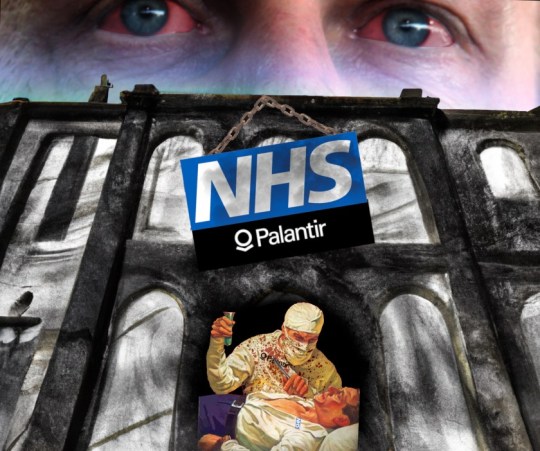
I'm on tour with my new, nationally bestselling novel The Bezzle! Catch me in TUCSON (Mar 9-10), then SAN FRANCISCO (Mar 13), Anaheim, and more!

Capitalism's Big Lie in four words: "There is no alternative." Looters use this lie for cover, insisting that they're hard-nosed grownups living in the reality of human nature, incentives, and facts (which don't care about your feelings).
The point of "there is no alternative" is to extinguish the innovative imagination. "There is no alternative" is really "stop trying to think of alternatives, dammit." But there are always alternatives, and the only reason to demand that they be excluded from consideration is that these alternatives are manifestly superior to the looter's supposed inevitability.
Right now, there's an attempt underway to loot the NHS, the UK's single most beloved institution. The NHS has been under sustained assault for decades – budget cuts, overt and stealth privatisation, etc. But one of its crown jewels has been stubbournly resistant to being auctioned off: patient data. Not that HMG hasn't repeatedly tried to flog patient data – it's just that the public won't stand for it:
https://www.theguardian.com/society/2023/nov/21/nhs-data-platform-may-be-undermined-by-lack-of-public-trust-warn-campaigners
Patients – quite reasonably – do not trust the private sector to handle their sensitive medical records.
Now, this presents a real conundrum, because NHS patient data, taken as a whole, holds untold medical insights. The UK is a large and diverse country and those records in aggregate can help researchers understand the efficacy of various medicines and other interventions. Leaving that data inert and unanalysed will cost lives: in the UK, and all over the world.
For years, the stock answer to "how do we do science on NHS records without violating patient privacy?" has been "just anonymise the data." The claim is that if you replace patient names with random numbers, you can release the data to research partners without compromising patient privacy, because no one will be able to turn those numbers back into names.
It would be great if this were true, but it isn't. In theory and in practice, it is surprisingly easy to "re-identify" individuals in anonymous data-sets. To take an obvious example: we know which two dates former PM Tony Blair was given a specific treatment for a cardiac emergency, because this happened while he was in office. We also know Blair's date of birth. Check any trove of NHS data that records a person who matches those three facts and you've found Tony Blair – and all the private data contained alongside those public facts is now in the public domain, forever.
Not everyone has Tony Blair's reidentification hooks, but everyone has data in some kind of database, and those databases are continually being breached, leaked or intentionally released. A breach from a taxi service like Addison-Lee or Uber, or from Transport for London, will reveal the journeys that immediately preceded each prescription at each clinic or hospital in an "anonymous" NHS dataset, which can then be cross-referenced to databases of home addresses and workplaces. In an eyeblink, millions of Britons' records of receiving treatment for STIs or cancer can be connected with named individuals – again, forever.
Re-identification attacks are now considered inevitable; security researchers have made a sport out of seeing how little additional information they need to re-identify individuals in anonymised data-sets. A surprising number of people in any large data-set can be re-identified based on a single characteristic in the data-set.
Given all this, anonymous NHS data releases should have been ruled out years ago. Instead, NHS records are to be handed over to the US military surveillance company Palantir, a notorious human-rights abuser and supplier to the world's most disgusting authoritarian regimes. Palantir – founded by the far-right Trump bagman Peter Thiel – takes its name from the evil wizard Sauron's all-seeing orb in Lord of the Rings ("Sauron, are we the baddies?"):
https://pluralistic.net/2022/10/01/the-palantir-will-see-you-now/#public-private-partnership
The argument for turning over Britons' most sensitive personal data to an offshore war-crimes company is "there is no alternative." The UK needs the medical insights in those NHS records, and this is the only way to get at them.
As with every instance of "there is no alternative," this turns out to be a lie. What's more, the alternative is vastly superior to this chumocratic sell-out, was Made in Britain, and is the envy of medical researchers the world 'round. That alternative is "trusted research environments." In a new article for the Good Law Project, I describe these nigh-miraculous tools for privacy-preserving, best-of-breed medical research:
https://goodlawproject.org/cory-doctorow-health-data-it-isnt-just-palantir-or-bust/
At the outset of the covid pandemic Oxford's Ben Goldacre and his colleagues set out to perform realtime analysis of the data flooding into NHS trusts up and down the country, in order to learn more about this new disease. To do so, they created Opensafely, an open-source database that was tied into each NHS trust's own patient record systems:
https://timharford.com/2022/07/how-to-save-more-lives-and-avoid-a-privacy-apocalypse/
Opensafely has its own database query language, built on SQL, but tailored to medical research. Researchers write programs in this language to extract aggregate data from each NHS trust's servers, posing medical questions of the data without ever directly touching it. These programs are published in advance on a git server, and are preflighted on synthetic NHS data on a test server. Once the program is approved, it is sent to the main Opensafely server, which then farms out parts of the query to each NHS trust, packages up the results, and publishes them to a public repository.
This is better than "the best of both worlds." This public scientific process, with peer review and disclosure built in, allows for frequent, complex analysis of NHS data without giving a single third party access to a a single patient record, ever. Opensafely was wildly successful: in just months, Opensafely collaborators published sixty blockbuster papers in Nature – science that shaped the world's response to the pandemic.
Opensafely was so successful that the Secretary of State for Health and Social Care commissioned a review of the programme with an eye to expanding it to serve as the nation's default way of conducting research on medical data:
https://www.gov.uk/government/publications/better-broader-safer-using-health-data-for-research-and-analysis/better-broader-safer-using-health-data-for-research-and-analysis
This approach is cheaper, safer, and more effective than handing hundreds of millions of pounds to Palantir and hoping they will manage the impossible: anonymising data well enough that it is never re-identified. Trusted Research Environments have been endorsed by national associations of doctors and researchers as the superior alternative to giving the NHS's data to Peter Thiel or any other sharp operator seeking a public contract.
As a lifelong privacy campaigner, I find this approach nothing short of inspiring. I would love for there to be a way for publishers and researchers to glean privacy-preserving insights from public library checkouts (such a system would prove an important counter to Amazon's proprietary god's-eye view of reading habits); or BBC podcasts or streaming video viewership.
You see, there is an alternative. We don't have to choose between science and privacy, or the public interest and private gain. There's always an alternative – if there wasn't, the other side wouldn't have to continuously repeat the lie that no alternative is possible.

Name your price for 18 of my DRM-free ebooks and support the Electronic Frontier Foundation with the Humble Cory Doctorow Bundle.

If you'd like an essay-formatted version of this post to read or share, here's a link to it on pluralistic.net, my surveillance-free, ad-free, tracker-free blog:
https://pluralistic.net/2024/03/08/the-fire-of-orodruin/#are-we-the-baddies

Image: Gage Skidmore (modified) https://commons.m.wikimedia.org/wiki/File:Peter_Thiel_(51876933345).jpg
CC BY-SA 2.0 https://creativecommons.org/licenses/by-sa/2.0/deed.en
#pluralistic#peter thiel#trusted research environment#opensafely#medical data#floss#privacy#reidentification#anonymization#anonymisation#nhs#ukpoli#uk#ben goldacre#goldacre report#science#evidence-based medicine#goldacre review#interoperability#transparency
530 notes
·
View notes
Text
I'm really panicked about the Cass Report sitch in the UK right now. I just have this horrible, sickened feeling. the articles proclaiming about the 'puberty blocker scandal' as if the report said that puberty blockers had been proven harmful, and not just that the report reoghtfully claimed that there hadn't been enough research.... which is basically the exact same situation as such medications as SSRIs, birth control in the NHS and yet those situations won't be used to bolster and reaffirm a hateful congregation of idiotic transphobes with too much power into dragging trans rights and healthcare in the UK through subsequent decades of incredibly harmful stagnation, fearmongering, and outright harm.
the Cass Report seems to me only to confirm what we know about almost every other sector of the NHS: that it's broken, underfunded, bogged down in failing beurocracy and not interested in preventative care as its mainline strategy. that's a position where the blame should be laid at the feet of the Conservative party, not at the feet of people who believe trans people should have adequate care which as at least a first line BELIEVES THEM
calling this a 'watershed' moment as if giving trans individuals gender affirming care is evil, while everyday within the NHS racism, medical misogyny, regional disparities between the North (edited add wales also) and Souths standards of healthcare which cause life expectancy to be lower, a mental health sector which is so utterly broken it can't actually help anyone. ..... etc etc etc are happening. its transphobia. its just hateful transphobia. transphobia which is now seen to be validated by idiots
I feel so sick and scared
364 notes
·
View notes
Text
I know I’m not doing well rn because a fucking advert from Scope I read yesterday has been going round my head and going sour in my stomach for about 18 hours rn.
It said some variant on “disability doesn’t stop people doing things”.
Before we even get into the difference between societal barriers and personal impairments etc etc - I’m just so *sick* of the level of toxic positivity the whole disability sector seems to be *increasingly* full of.
Particularly while more and more people who depend on social care for things other than intimate care seem to be getting their care packages just cut suddenly without any explanation or warning. This is for things like “keeping your house at basic levels of cleanliness and hygiene”, “washing clothing” and “cooking”. I’ve seen this from friends and strangers on groups I’m in, all across the UK. As if the entire sector has just decided that if you can toilet and get clothing on without needing physical aid to do those things nothing else in your life matters, including being able to eat, wear clean clothing or get rid of rubbish.
We have already seen care packages for leaving your home get whittled away, despite these being still legally guaranteed under the Care Act. The idea that it’s fine to be completely socially isolated as long as someone came to help you with the basics of home care has been largely accepted in so many councils for some years now; that exercising, maintaining relationships with friends and family and getting fresh air was some sort of ridiculous luxury. *Despite* the legal guarantees remaining; the sector just made a pact to mostly ignore them.
And now that seems to have been redefined once again to “if you’re not physically lying in your own filth, the idea that your home should meet basic hygiene standards and you should be able to eat hot food is a ridiculous luxury”.
And I’m lying in my bed feeling like a total failure because getting Cynthie out for a rollator walk and going downstairs to eat dinner 3-4 days a week turns me into being incoherent through fatigue by about 6pm atm. I managed to play Pendragon on Discord last night for the first time in a fortnight and that felt a huge achievement.
And Scope are chirping away about disability not preventing anyone from achieving anything.
*screams*
#disabled#disability#chronic illness#disableism#chronic pain#chronic fatigue#autistic adult#toxic positivity#social care#uk politics#austerity#ableism#FFS
82 notes
·
View notes
Text
Because of what's happening on Twitter...
I've made a little diagram to demonstrate why billionaires and the ultra-wealthy are bad for society.

(Text in Image)
"If we view society as a body, every sector is like a different organ within the body that serves a function and works in harmony with other organs to maintain balance. Every part of the body is important for the whole thing to function."
"The ultra-wealthy want you to believe they are the beating heart and thinking mind of the society – they are the innovators who create our jobs and their brilliance drives society forward. They deserve to be at the top of society because they have earned that. Without them, the body won’t function because they are the most important part."
"In reality, they are more like a malignant tumour, sucking all of the blood (resources) away from everything else (people and the planet) to fuel its own infinite growth, depriving the rest of the body and slowly killing it. Workers create all of the innovation and keep things running, the ultra-wealthy take all the credit."
------------------------------------------------------------------------
This is a public domain image so feel free to pinch it for whatever.
Elon Musk has put the careers of thousands of small business owners who depend on Twitter (myself included) in jeopardy by completely running it into the ground. Before this, Mark Zuckerberg had already been doing the same when he started pursuing Metaverse, making Instagram and Facebook much more unusable for artists. Do I really need to go into other examples of CEOs and very normalised practise of wage theft?
Meanwhile, the UK currently has the richest Prime Minister in its history. What is this man doing with this wealth? Continuing the Tory legacy of austerity in order to line his pockets and the pockets of his crony friends. This has resulted in a devastating cost of living crisis that continues to ravage the country as people's energy bills skyrocket out of control.
My diagram is pretty basic and lacks nuance, there's definitely more I could elaborate on with this comparison but I really don't have time. I just want people to get the basic point of how billionaires view themselves vs what function they actually serve. I'm also not here to debate whether some organs are more important than others since I'm not a doctor, that's not really the point here. And no, I don't care if people think I'm being harsh by comparing billionaires to a tumour. If they don't want to be compared to one they should stop acting like one. Jeff Bezos could end world hunger right now and chooses not to.
Also, I know a lot of people are going to come at me with the argument that billionaires give away massive amounts of money. First off, people like Jeff Bezos only give large sums of money to charity a.) for the sake of improving their public image and b.) because giving to charity allows them to write it off in their taxes. Also, charities in of themselves have a lot of problems, but that's a blog post for another day. Mutual Aid is a better way to help people directly. Really, the ultra wealthy need to be taxed, of course they do everything within their power to avoid taxes.
Also:

"Earning a lot of money" and "holding onto a lot of money" are two different things. You cannot be a multi-millionaire unless you hold onto that money. If you give away massive chunks of it to enrich society, you cease to be a billionaire.
Oh and this is worth a watch, too.
Furthermore:
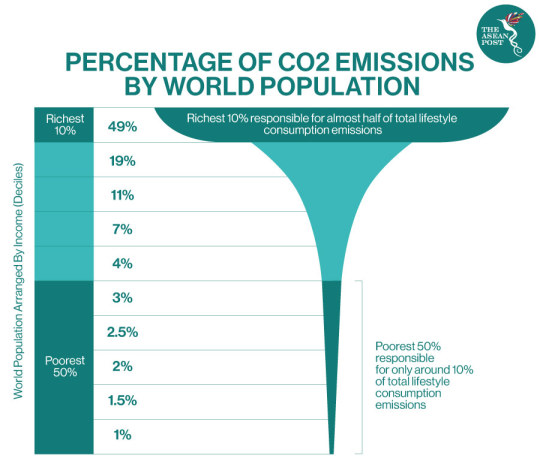
Also before the inevitable great man comments:

Being a billionaire is a moral failing. Nobody needs that much money.
[Slight edit here - I made the assertion that a billionaire could not spend all of their money in their lifetime, but as someone in the comments pointed out it's very easy for them to completely waste billions in no time. Elon Musk and Mark Zuckerberg have shown that].
Anyway, if you would like to see more anti-Capitalist art from me, I am currently working on a webcomic called "Flowerpunk" - a story about a group of anarchists who are trying to save the city of Wyrdon from a supernatural plague known as "the rot." The comic heavily discusses disaster Capitalism and how the rich will use mass death and destruction as an opportunity to further line their pockets.
I also like to do little anti-Capitalist doodles relating to this project, which I plan to make into posters at some point.



Please consider donating a Ko-Fi also if you would like to help support this project. I am really struggling at the moment because I've basically lost a massive chunk of my client base due to this Twitter implosion and also because of the AI BS that has made it impossible for me to get any reach nowadays. The last year or so has been an absolute nightmare for my career because of all of this.
Thank you all for your continued support! Hopefully I can re-establish my audience here on Tumblr and wherever else I decide to go.
#Twitter#twitpocalypse#elongated muskrat#eat the rich#eat the fucking rich#tax the rich#tax the 1%#tax the billionaires#anti capitalism#workers of the world unite#working class solidarity#Can you tell that I am absolutely fucking done with this BS?
784 notes
·
View notes
Note
She keeps attacking the medical standards and hospital standards of the UK and the standards of their doctors and nurses and midwives etc. like it’s definitely an attack due to their close ties to QEII, Anne, Catherine, Sophie etc. but also helps build mistrust and distrust in genuine medical care & staff and in properly licensed medical care & staff and to promote pseudoscience and dangerous misconceptions & misinformation too. Doctors, nurses and midwives and even volunteers whether in the NHS or private sector are very deeply trained in mental health care in all areas and especially in maternal mental health and pregnancy mental health too. They are trained to see it when we cannot see or understand how we are acting
They do not realize the harmful message they just sent. Especially the words uttered by Harry. Do not trust the professionals because they won't know how to help you*
*paraphrased
61 notes
·
View notes
Text
BREAKING NEWS -
THE ROYAL FOUNDATION BUISNESS TASKFORCE FOR EARLY CHILDHOOD RELEASES NEW REPORT!

Business investment in early childhood could unlock £45.5bn in value a year for the UK economy, according to a report by a taskforce created by the Princess of Wales.
In the report, CEOs from eight leading companies urged “businesses of all sizes across the UK, to join us and help build a healthy, happy society for everyone”.
The report by the Royal Foundation Business Taskforce for Early Childhood, set up by the princess in March 2023, said the figure included £12.2bn from equipping people with improved social and emotional skills in early childhood, £16.1bn from reducing the need to spend public funds on remedial steps for adverse childhood experiences and £17.2bn from supporting parents and caregivers of under-fives who work.
The princess, who announced in March she was undergoing preventive chemotherapy after a cancer diagnosis, was said to be “excited” by the report.
A Kensington Palace spokesperson said the release of the report should not be seen as the princess returning to work, but she has been kept fully up to date and seen the report.
Taskforce members announced new initiatives, including:
The Co-operative Group creating a specific early childhood fund as part of its unique apprenticeship levy share scheme, and committing to raise £5m over the next five years, creating more than 600 apprenticeships.
Deloitte focusing its ongoing investment in Teach First to include the early years sector for the first time, supporting 366 early years professionals in 2024.
NatWest Group extending its lending target for the childcare sector to £100m, launching an early years accreditation scheme to its staff and producing a financial toolkit for childcare providers to help them grow and succeed.
Ikea UK and Ireland expanding its contribution of support, design expertise and products for babies and young children to six new locations across the UK to help families with young children experiencing the greatest disadvantage.
The Lego Group donating 3,000 LEGO® Education Build Me “Emotions” sets, supported by training materials, to early years providers in the UK.
Christian Guy, the executive director of the Royal Foundation Centre for Early Childhood, said it was a “rallying cry” to business leaders to “transform the way our country supports the vital early years”.
The princess, Guy said, “feels passionately about the transformational impact of getting this right, together with business, both for the current generation and many more to come. She is looking forward to seeing momentum grow in the coming months and years.” The work of the centre was “rolling on while she recovers”, he added.
The Royal Foundation Business Taskforce for Early ChildhoodThe taskforce – comprising CEOs from the Co-operative Group, NatWest, Unilever, Ikea, Iceland Foods, Aviva, Deloitte and Lego – identifies five areas in which businesses can make the greatest impact for children under five, the adults around them, the economy and wider society.
These are: building a culture prioritising early childhood within businesses, local communities, and wider society; helping the families facing the greatest challenges access the basic support and essentials they need; offering parents and carers greater support, resources, choice, and flexibility with their work; prioritising and nurturing social and emotional skills in young children and the adults in their lives; and supporting initiatives that increase access to quality, affordable and reliable early childhood education and care.
#news#princess of wales#the princess of wales#princess catherine#princess kate#21052024#british royal family#british royals#royalty#royals#brf#royal#british royalty#kate middleton#catherine middleton
93 notes
·
View notes
Note
Yeah I live in the UK and my mum is a consultant surgeon in obstetrics and I remember asking her about the two epidurals, the umbilical cord wraparound, misuse of gas and then the ASAP return to home and she said right away that it would never happen - NHS or private sector - both abide by strict guidelines and especially so in obstetrics and paediatrics (of all ages) and my mum said that the only time any new mum would be allowed home after such a traumatic birth would be if they hadn’t actually birthed the child & that the child was born to a surrogate - and my mum says that a lot of private sector hospitals are being used for surrogacy pregnancies nowadays but also what Harry said in Spare & what else has been said, my mum says The Portland would be medically negligent and sued nonstop for such bad practices & care
the only time any new mum would be allowed home after such a traumatic birth would be if they hadn’t actually birthed the child & that the child was born to a surrogate -
the odds are stacking up...
73 notes
·
View notes
Text
When you do not know a thing about the issue at stake...
...perhaps it's better to remain silent.
Some of you know, others don't - and that's fine - but my main field of expertise is labor law.
I just read this in anger and disbelief:
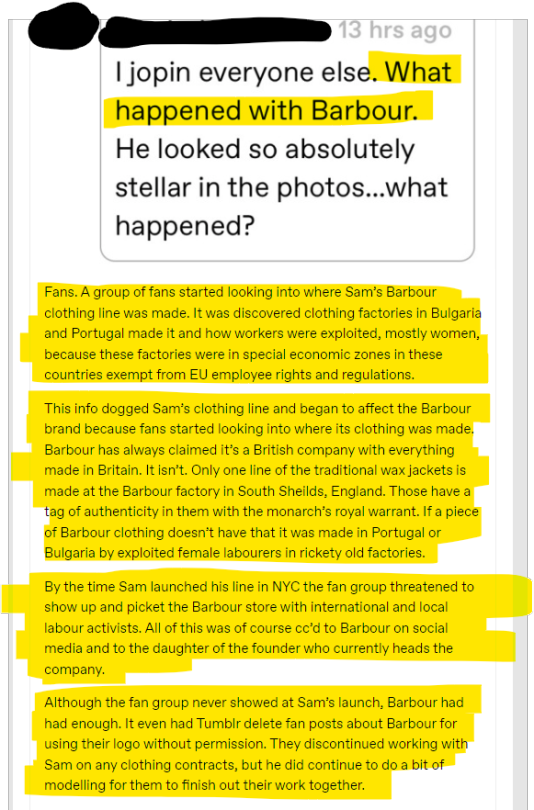
Look, lady. I don't care who the hell you are, what you do for a living or why you felt entitled to answer those insistent questions on your side of the fandom. I suppose you are North American and have no idea of how things work on this side of the pond. It is fine: I might know what a Congress filibuster is, for example, but I'd be severely unable to judge the finer points of competence sharing between Fed and state level.
The difference between you and me?
I keep my mouth shut and/or do my own research before opening it in public.
Have you no shame to write things like: 'It was discovered clothing factories in Bulgaria and Portugal made it and how workers were exploited, mostly women, because these factories were in special economic zones in these countries exempt from EU employee rights and regulations.'
HOW DARE YOU? What strange form of illiterate entitlement possessed you to utter such things with confidence, comfortably hidden behind a passive voice ('it was discovered')?
Portugal joined the EU in 1986. Bulgaria (and my country) joined the EU in 2007. I have given 5 relentless years of my life to make this collective political project a reality, along with hundreds of other people my age who chose to come back home from the West and put their skills to good use for their country. In doing so, I rejected more than 10 excellent corporate job offers in France and China. To see you come along and write such enormities is like having you spit in my face.
Article 4 of the Treaty on the Functioning of the European Union (aka The Treaty of Rome) is formal and clear, as far as competence sharing between the EU and its Member States goes (the UK was still, back then, a full member of the EU - it quit on February 1st 2020):
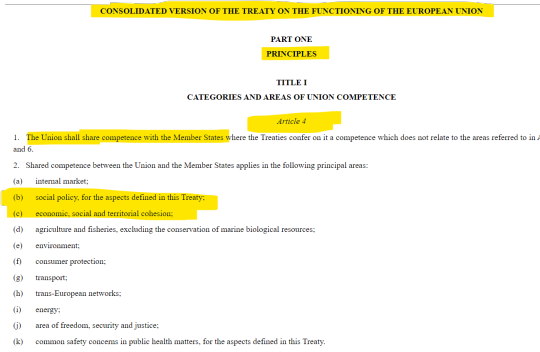
That means that ALL the EU regulations are being integrated into the national legislation of the Member States. This is not a copy/paste process, however. And because it is a shared competence area, the Member States have a larger margin of appreciation into making the EU rules a part of their own. While exceptions or delays in this process can be and are negotiated, the core principles are NEVER touched.
Read it one hundred times, madam, maybe you'll learn something today:
THERE ARE NO SPECIAL ECONOMIC ZONES IN THE EUROPEAN UNION. THE WHOLE FUCKING EUROPEAN UNION IS A SPECIAL ECONOMIC ZONE, THIS IS WHY IT IS CALLED THE SINGLE MARKET.
What the fuck do you think we are, Guangzhou? We'd wish, seeing the growth statistics!
Now, for the textile industry sector and particularly with regard to the Bulgarian market, a case very similar to my own country. Starting around 1965, many big European textile players realized the competitive advantage of using the lower paid, readily available Eastern European workforce. In order to be able to do business with all those dour Communist regimes, the solution was simple and easy to find: toll manufacturing.
It worked (and still does!) like this:
The foreign partner brings its own designs, textiles and know-how into the mix - or more simply put, it outsources all these activities. The locals transform it into the finished product, using their own workforce. The result is then re-exported to the foreign partner, who labels it and sells it. In doing so, he has the legal obligation to include provenance on the label ('made in Romania', 'made in Indonesia', 'made in Bulgaria' - you name it).
The reason you might find less and less of those 'made in ' labels nowadays at Primark and more and more at Barbour, Moncler and the such is the constant raise of the workers' wages in Eastern Europe since 1990 (things happened there, in 1989, maybe you remember?). We are not competitive anymore for midrange prêt-à-porter - China (Shein, anyone?), Cambodia and Mexico do come to mind as better suppliers. To speak about 'exploited female labourers in rickety old factories' is an insult and a lie. They weren't exploited back in the Eighties, as they are not now (workers in those factories were and still are easily paid about 50% more than all the rest) and the factories being modernized and constantly updated was always a mandatory clause in any contract of the sort. Normal people in our countries rarely or ever saw those clothes. You had to either be lucky enough for a semi-confidential store release or bribe someone working there and willing to take the risk, in order to be able to buy the rejected models on the local market.
If I understood correctly, you place this critical episode at the launch of the limited SRH & Barbour collection, for the fall of 2018. How convenient for you, who (I am told by trusted people) were one of the most vocal critics of S during Hawaii 2.0!
And as far as Barbour goes, it never pretended to manufacture everything in the UK only:

This information is absolutely true. You can read the whole statement, signed in October 2017 by one of their Directors, Ian Sime, here: https://www.barbour.com/us/media/wysiwyg/PDF/Ethical_Statement_October_2017.pdf
And a snapshot for you:
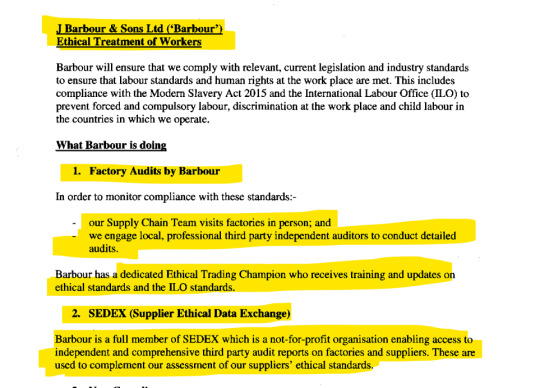
Oh, and: SEDEX is a behemoth in its world, with more than 75.000 companies joining as a member (https://www.sedex.com/become-a-member/meet-our-customers/). Big corporations like TESCO, Dupont, Nestle, Sainsbury's or Unilever included.
I am not Bulgarian, but I know all of this way better than you'll probably ever do. The same type of contracts were common all over Eastern Europe: Romania, Poland, the GDR (that's East Berlin and co, for you) and even the Soviet Union. I am also sure your Portuguese readers will be thrilled to see themselves qualified by a patronizing North American as labor exploiters living in a third-world country with rickety factories.
You people have no shame and never did. But you just proved with trooping colors you also have no culture and no integrity. More reasons to not regret my unapologetic fandom choice.
I expect an angry and very, very vulgar answer to this, even if I chose to not include your name/handle. The stench of your irrelevance crossed an ocean.
127 notes
·
View notes
Text

Aimee’s 2023 royal family engagement count: The final results!
Disclaimer; everyone’s counts will be different, people have different rules to their method of counting the Court Circular. It isn’t a definitive count and is done just for fun 💗
The court circular doesn’t record any work behind the scenes, only public engagements, official meetings and luncheons/dinners. It’s more a gauge of their public facing roles.
👑 Princess Anne 👑
Once again Princess Anne tops the chart as the hardest working royal, completing 467 engagements.
She has done 393 engagements in the UK.
She travelled to 10 different countries this year and did 74 engagements there. 🇨🇾🇪🇪🇳🇿🇦🇺🇫🇷🇨🇦🇩🇪🇯🇪🇮🇳🇬🇮
Dubbed by some as the unofficial Queen of Scots she did 62 in Scotland.
King Charles III
In the first year of his reign King Charles did a grand total of 463 engagements
In the UK he did 386 engagements.
He travelled to 5 different countries where he completed 76 engagements and did 3 full royal tours in Germany, France and Kenya. He also hosted a state visit for South Korea at Buckingham Palace. 🇩🇪🇷🇴🇫🇷🇰🇪🇦🇪
What is also worth mentioning is that he has Red Boxes that he has to go through every single day, except Christmas Day and Easter Sunday as well as a lot of work behind the scenes.
Prince Edward, The Duke of Edinburgh
This year, on his 59th birthday, Prince Edward became the Duke of Edinburgh, taking the title of his father. With this he increased his work with the Duke of Edinburgh award and travelling to visit international sections of the award. Prince Edward also visited a lot of theatre related organisations and youth centres and charities.
He completed 294 this year and visited 13 countries on solo tours and with his wife. 🇹🇨🇧🇸🇺🇸🇨🇦🇩🇪🇨🇿🇮🇪🇹🇷🇧🇭🇸🇬🇳🇿🇦🇺🇮🇩
Sophie, The Duchess of Edinburgh
In 2023 Sophie carried on her hard work in areas like women’s rights in disadvantaged areas, avoidable blindness, hygiene and agriculture.
She completed 226 this year in the UK and the commonwealth and visited 10 countries on solo tours and with her husband. 🇳🇱🇹🇨🇧🇸🇮🇶🇮🇹🇪🇹🇨🇦🇨🇴🇨🇭
Prince Richard, The Duke of Gloucester
The Duke of Gloucester has this year completed 208 engagements in the UK.
He continued his long lasting work in heritage, architecture, the St John’s Ambulance and military organisations.
Hopefully next year we will see him do some overseas engagements. 🕯️
Queen Camilla
In the year of her Coronation, Queen Camilla carried out 198 engagements.
She visited Germany, France and Kenya where she did 42 engagements whilst on official tours. 🇩🇪🇫🇷🇰🇪
She focused a lot of her engagements this year on sectors close to her heart like women’s & children’s charities, osteoporosis care and animal welfare.
Prince William, The Prince of Wales
The Prince of Wales this year carried out engagements in the UK and the Commonwealth in areas like mental health, homelessness and conservation. In 2023 he did 183 engagements.
Prince William travelled to 4 countries where he did 32 engagements related to Earthshot in USA and Singapore, visiting Ukrainian troops in Poland, attending the Jordanian royal wedding in June and finally travelling to Kuwait to give his condolences to to The Emir of Kuwait following the death of The Emir Nawaf Al-Ahmad Al-Jaber Al-Sabah. 🇵🇱🇺🇸🇯🇴🇸🇬🇰🇼
Catherine, The Princess of Wales
The Princess of Wales carried out 134 engagements throughout 2023. Catherine continued her work in her Early Years foundation and childhood development.
She visited France for two, one off engagements for the rugby World Cup in France and to Jordan for Crown Prince Hussein and Princess Rajwa’s wedding in June. 🇫🇷🇯🇴
Hopefully we will see her and the Prince of Wales go on a couple of overseas tours next year now that their children are older.
Birgitte, The Duchess of Gloucester
The Duchess of Gloucester has this year completed 127 engagements in the UK. She continued her long lasting work in sports, the arts (Opera, Ballet, Acting etc…) and accompanying her husband to official engagements.
Vice Admiral Sir Tim Laurence
Although not an official working royal, Sir Tim often attends as a great support to his wife’s engagements as well as having his own non-royal patronages and interests. It was recently announced that he would become chair of the Science Museum group and is the patron of a number of heritage organisations.
He accompanied his wife to a total of 92, represented her 4 times and accompanied her to 27 engagements abroad in 5 countries. 🇪🇪🇳🇿🇦🇺🇫🇷🇬🇮
(Operation working royal Tim) 👏
Prince Edward, The Duke of Kent.
Despite being 88, Prince Edward, the late Queens cousin, has carried out 75 engagements even with his ailing mobility.
He continued his valued hard work with organisations like the RNLI, the Royal Scots Guards and the Commonwealth War Graves Commission, which he recently passed on the presidency to the Princess Royal.
Princess Alexandra of Kent
Although she is practically retired now, we have seen Princess Alexandra attend four official engagements in 2023. Firstly she attended a Reception for British East and South-East Asian Communities, secondly to present medals to members of The Royal Lancers, thirdly she attended the Coronation of King Charles and Queen Camilla and lastly she visited the Royal Chelsea Flower Show.
This year the British Royal Family completed a grand total of 2476 in the UK and 29 different countries across the world.
🇨🇾🇪🇪🇳🇿🇦🇺🇫🇷🇨🇦🇩🇪🇯🇪🇮🇳🇬🇮🇷🇴🇰🇪🇵🇱🇺🇸🇯🇴🇸🇬🇹🇨🇧🇸🇨🇿🇹🇷🇧🇭🇸🇬🇮🇩🇳🇱🇮🇶🇮🇹🇪🇹🇨🇴🇨🇭🇰🇼
See below for engagements from the past decade and the types of engagements carried out in 2023


#thank you for following me on this journey#i might carry on in 2024#time will tell#king charles iii#queen camilla#william prince of wales#catherine princess of wales#prince edward duke of edinburgh#sophie duchess of edinburgh#princess anne#princess royal#tim laurence#timothy laurence#prince richard duke of gloucester#birgitte duchess of gloucester#prince edward duke of kent#princess alexandra of kent#2023 engagement count
76 notes
·
View notes
Text
Hundreds of women have gone on strike in Scotland as three more councils face claims over equal pay.
Almost 500 workers walked out of their council roles in Falkirk, Renfrewshire and West Dunbartonshire in protest at a pay grading system which they say is outdated and pays women less than comparable male-dominated jobs.
Their action follows a strike by more than 8,000 female carers, caterers and cleaners in Glasgow, in 2018, which resulted in a payout of around £500m from Glasgow council, a bill it is yet to settle fully. It was the biggest equal pay strike in history in the UK.
Workers in similar jobs in Dundee, Perth and Kinross, Angus, Fife and Moray are now in ongoing disputes over equal pay.
The GMB union, which represents many of the women bringing claims, said local authorities across Scotland risk being bankrupted. GMB Scotland secretary Louise Gilmour said Scotland’s councils were approaching equal pay claims “like the Titanic approaching the iceberg”. “Councillors have their heads in the sand and executives have their fingers in their ears, but these equal pay claims will come, will be won and will need to be settled.
“We know local authorities are struggling to make ends meet and we know why. But to suggest women workers are somehow making things worse by asking for money they are owed … is as dishonest as it is disgraceful.”
In England, Birmingham city council last year said it was unable to balance its books due, in part, to equal pay claims. The GMB has ongoing equal pay disputes with a number of other councils including Coventry and Cumberland.
Gilmour called on the Scottish government to create a new specialist body to settle equal pay claims nationwide and enforce payments.
Fiona O’Brien, a home carer in Renfrewshire since 2016 and a GMB rep, said she took strike action “as a last resort because enough is enough”.
“For a long time, we’ve been told: ‘you’ll never go on strike, you care too much, you’ll never stand up for yourselves’,” she said. “But we’ve had enough now – we’ve been taken for granted for too long.”
She said her role is different to what was advertised and more complex than the grade it is paid at, including administering medications, caring for people with dementia and mental illness, using specialist equipment and physically moving people with restricted mobility.
“It’s been inspirational to see us all coming together and standing up for what’s right and fair,” she said. “This could potentially change the road for a lot of people working in care and could also bring more people into the sector.”
In the event of a successful equal pay claim, higher pay grades could be retrospectively applied, allowing workers to claim up to five years of back pay and costing councils millions of pounds, the GMB said.
The union said it expects to see pay reviews in at least a dozen more Scottish local authorities.
A spokesperson for Falkirk Health and Social Care Partnership said: “Falkirk council is committed to upholding equal pay, and continues to engage with GMB. We will seek to minimise disruption for those in need of our care and support at home services.”
A spokesperson for West Dunbartonshire council said: “We are committed to fair pay for home carers and, following a thorough and robust job evaluation process, the pay of a typical home carer has recently risen by at least £2,500 per annum through regrading of the role.”
A Renfrewshire Health and Social Care Partnership spokesperson said: “Negotiations between the Health and Social Care Partnership with all trade unions continue. A further offer was presented to all three trade unions, and Unison and Unite have paused industrial action as they consider this renewed offer. Unfortunately, GMB is continuing with industrial action following a consultative ballot with its members.”
Renfrewshire council did not respond to the Observer’s request for comment.
41 notes
·
View notes
Text
🍵 One person's experience meeting Meghan -- story found in comments here by u/ContentPineapple3330 🍵
One person's experience meeting Meghan -- story found in comments here Hi! Last week, I shared my own "2 degrees of separation" tea I heard on an airplane -- and we received some amazing comments from people sharing their own unique stories! However, below was a story we've never heard before, by reddit user Extreme-Sight who actually met her.
However, the comment appeared after the post was no longer "hot," and thus, it did not get the attention (I think) it deserved.
(Note: Ugh! I just tried to link to the subreddit so you can pass on the karma to the actual commenter, but alas -- it won't allow me to link it. So, just search for the username, and like the comment, if you have the time.)
The story, copy/pasted:
The Charity/third sector is packed to the brim in the UK, especially the cancer sector, and a Royal Patron can make all the difference. I'm lucky enough to have worked for one who had the late Queen as Patron. I was head of research, and we did (do) some great work in exploring holistic care for childhood cancers. One of the reasons I work in research and now in policy making for the Government, is that I'm wheelchair bound, and people can be uncomfortable with a disabled doctor.
My eldest son is a nurse who works in the same field.
So what's this got to do with Madam?
In 2019, planning had already started for the succession of Patronages once the Queen passed on, and it was suggested that Madam may want to take us on, a charity with children and families at its centre is a good look!So she came for a visit. These Royal visits are really important as big donors want meet and greets, we get a years worth of press and publicity and the staff and the families we support have a great day, we get donations for catering and funfair equipment and it's a party.
She was a fucking brat
She sulked when we told her team she couldn't have a photo op hugging the children and didn't want a sit down to talk to the mums about their experiences
My son wheeled me in the line for the meet and greet and when when I was introduced (I have a gender neutral first name) and our CEO explained my big patent, she reached over me to shake my sons hand, obviously flirting with someone almost half her age, completely ignoring me.
When he explained I was the genius (his words), she just said "oh" and walked off. Our CEO was gobsmacked at her rudeness and the Palace was so apologetic.
Anyway we got Queen Camilla. She's brilliant and has an amazingly dirty sense of humour.
Thank you for reading my TED talk on how not to make a first impression
📌 Link to original tea by u/Extreme-Sight post link author: ContentPineapple3330 submitted: July 18, 2024 at 04:03PM via SaintMeghanMarkle on Reddit disclaimer: all views + opinions expressed by the author of this post, as well as any comments and reblogs, are solely the author's own; they do not necessarily reflect the views of the administrator of this Tumblr blog. For entertainment only.

#SaintMeghanMarkle#harry and meghan#meghan markle#prince harry#fucking grifters#grifters gonna grift#Worldwide Privacy Tour#Instagram loving bitch wife#duchess of delinquency#walmart wallis#markled#archewell#archewell foundation#megxit#duke and duchess of sussex#duke of sussex#duchess of sussex#doria ragland#rent a royal#sentebale#archetypes with meghan#invictus#invictus games#Sussex#WAAAGH#american riviera orchard#ContentPineapple3330#insider tea#top post#psa
23 notes
·
View notes
Text
It has often been dismissed as utopian thinking, a pie-in-the-sky idea that wouldn’t survive contact with reality. But the four-day week has once again quietened critics, as the results of the world’s trial suggest that it’s a win-win for employees and their bosses.
Workers who adopted a shorter week with no loss of pay were found to be happier, more productive, took fewer sick days and generated more revenue for their employers, a landmark study has found.
The Study
Led by researchers at the University of Cambridge, England, the study assessed the impact of a pioneering four-day week trial, which took place in the UK between June and December 2022. Of the 61 firms that took part – among them online retailers, financial service providers and restaurants – 56 pledged to make the move permanent. [Note: That's 91% of the firms!!]
The Results
Researchers found that 71% of participants reported lower levels of burnout, with 39% saying they were less stressed than before the trial. What’s more, 60% found that they were better able to combine paid work with care responsibilities, while 62% said it was easier to combine work with their social lives.
Unsurprisingly, this translated into a 65% reduction in sick days, and a 57% drop in the number of staff leaving compared with the same six-month period the previous year.
Concerns that switching workers to a four-day week would impact profits did not materialise. In fact, when compared to a similar period from previous years, organisations reported revenue increases of 35 per cent on average.
Trials have continually proved successful
"We feel really encouraged by the results, which showed the many ways companies were turning the four-day week from a dream into a realistic policy, with multiple benefits,” said Dr David Frayne, research associate at University of Cambridge. “We think there is a lot here that ought to motivate other companies and industries to give it a try.”
The trial involved two months of preparation, with workshops, coaching, mentoring and peer support for participants. Resisting the idea that the trial must be ‘one-size-fits-all’, each firm designed a policy tailored to its particular needs.
Some academics have questioned the merits of a four-day week, arguing that it can create more stress for employees because they have the same amount of work to do in fewer hours.
Nevertheless, with trials taking place around the world, often with positive results, the shorter working week appears finally to be going mainstream.
Of the UK trial, Joe Ryle, director of the 4 Day Week Campaign, said: “This is a major breakthrough moment for the movement towards a four-day working week. Across a wide variety of different sectors of the economy, these incredible results show that the four-day week with no loss of pay really works.
“Surely the time has now come to begin rolling it out across the country.”
-via Positive News, 2/21/23
#four day work week#antiwork#anti work#psychology#business#workers rights#labor#capitalism#good news#hope#accessibility#workplace#work life#work life balance
340 notes
·
View notes
Note
are you pro, or anti immigration for refugees? what do you think in regards to the immigration situation with sweden?
Well refugees aren’t emigrating so they can’t be counted in the category of immigration. Refugees have the legal right to claim asylum in any country, regardless of their immigration policies. Our right-wing media conflates the two groups (on purpose) but it’s very important that we don’t treat them as belonging to the same category.
I assume you’re talking about Sweden requiring non-EU labour migrants to have secured a monthly salary amounting to at least 80% of the gross median salary in Sweden to obtain a work permit. It will backfire, as similar policies always have across the EU. Labour migration is good for economies, this is a demonstrable fact that nobody seems to want to acknowledge anymore. Modern capitalism literally depends on underpaid migrant workers.
This is a policy informed by xenophobia rather than economics, and it’s sad to see Sweden going to same way we have in the UK. i would bet that it will be quietly watered down as soon as the relevant sectors (farming, manufacturing, care, medicine, service) feel the full effects. That’s exactly what happened in the UK less than a year after we implemented our own ‘hostile environment’ immigration policies.
In an ideal world (free from capitalism) the unfettered free movement of all peoples would be a human right, but if we’re talking purely national policy here and now then immigration of course needs to happen at a controlled rate to allow communities to adequately support, integrate and provide for their new members. That means a robust social welfare system, well-funded healthcare and education, and a true living wage. Of course, I support refugees as any reasonable person should.
24 notes
·
View notes